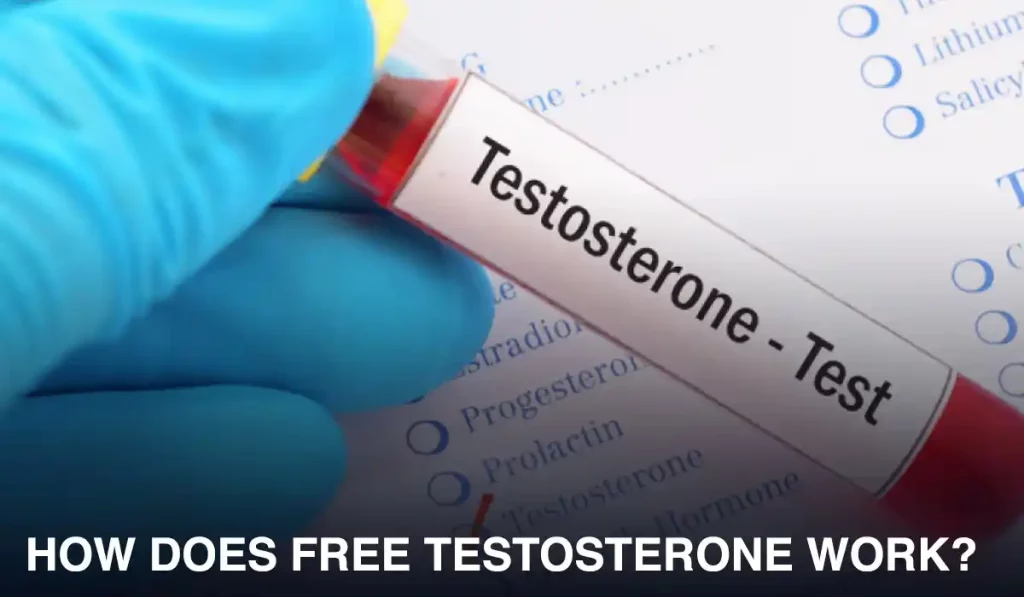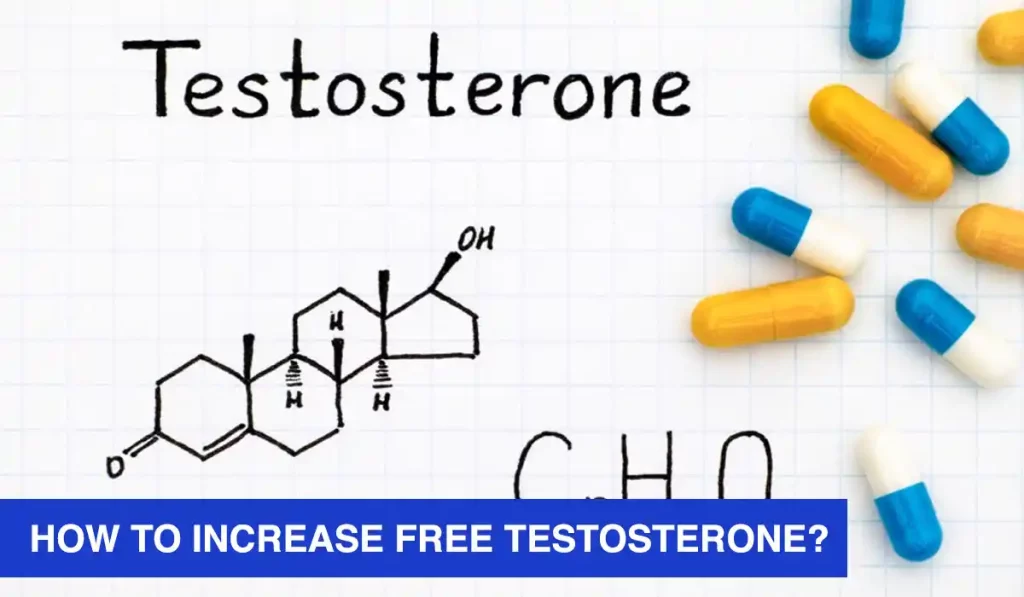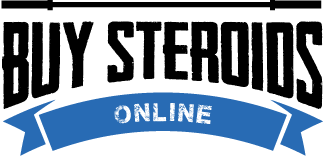FREE SHIPPING ON ORDERS $99+ | SAME DAY SHIPPING ON ORDERS PLACED BEFORE 12PM PST
What is Free Testosterone? Free vs Total Testosterone Explained
Free testosterone is the unbound fraction of testosterone circulating in the bloodstream. It is available for immediate use by the body’s cells. Recognizing the significance of free testosterone goes beyond assessing total levels, as it represents the bioavailable and active form of the hormone.
Understanding free testosterone is essential for a comprehensive evaluation of hormonal status, as it influences crucial physiological functions like muscle development, libido, and overall energy levels.
Free Testosterone
Free testosterone refers to the fraction of testosterone circulating in the bloodstream that is not bound to proteins. Only 2-5% of testosterone is free, according to medichecks.com. This unbound testosterone is integral to numerous physiological processes, including muscle growth, maintaining bone density, and regulating libido.
Unlike total testosterone, which encompasses both bound and free forms, measuring free testosterone provides a more precise gauge of the hormone’s bioavailability. The calculation of free testosterone levels typically involves using mathematical formulas that consider the total testosterone concentration and the levels of binding proteins, such as sex hormone-binding globulin (SHBG) and albumin.
Monitoring free testosterone levels is crucial for assessing hormonal health and addressing conditions related to testosterone imbalance, like hypogonadism or andropause. This approach contributes to a comprehensive strategy for managing men’s health by providing valuable insights into hormonal status.
How does free testosterone work?

Free testosterone works as the active, unbound form of testosterone in the bloodstream, available for cellular absorption. After being produced by the testes, it binds to androgen receptors on specific tissues, particularly muscle cells, facilitating protein synthesis and fostering muscle development.
Furthermore, free testosterone contributes to vital physiological processes, such as sustaining libido, bone density, and overall energy levels.
Total Testosterone
Total testosterone refers to the complete quantity of testosterone circulating in the bloodstream, serving pivotal roles in diverse physiological functions in both men and women, as per prestigemensmedical.com. This sex hormone is primarily synthesized by the testicles in men and the ovaries in women, with a smaller contribution from the adrenal glands.
Total testosterone encompasses both bound and free testosterone in the blood. Bound testosterone is attached to proteins like albumin and sex hormone-binding globulin (SHBG), while free testosterone is unbound and readily available for cellular use.
Calculating total testosterone involves measuring both these forms to provide a comprehensive assessment of hormone levels.
Testosterone is integral for the development of male secondary sexual characteristics and the maintenance of bone density, muscle mass, and libido.
Monitoring total testosterone levels is essential for evaluating hormonal health and diagnosing conditions such as hypogonadism or androgen deficiency. A balanced testosterone level is crucial for overall well-being and reproductive health.
Free vs Total Testosterone
Free testosterone represents the unbound fraction of testosterone in the bloodstream, easily accessible for cellular absorption. In contrast, total testosterone encompasses both free testosterone and testosterone bound to proteins, offering a comprehensive assessment of overall testosterone levels in the body.
| Parameter | Free Testosterone | Total Testosterone |
| Definition | The fraction of testosterone that is not bound to proteins, is available for cellular use. | The complete amount of testosterone is found in the bloodstream, including both free and bound to proteins. |
| Binding Proteins | Not attached to proteins, circulates freely in the bloodstream. | Bound to proteins, mainly to albumin, and SHBG. |
| Biological Activity | Represents a biologically active form of testosterone. | Comprises of both active (free) and inactive (bound) forms. |
| Testing Method | Measured through direct assays or calculated based on measurements of total testosterone, albumin, and SHBG. | Measured directly through blood tests. |
| Clinical Significance | Considered more reflective, available for physiological functions. | Provides an overall picture of testosterone levels, not available accurately to reflect. |
Why does Free Testosterone matter most?
Free testosterone is crucial for maintaining various physiological functions, including enhanced muscle strength and growth, increased vitality and endurance, reinforced bone strength and development, enhanced sexual well-being, and cardiovascular support.
- Enhanced Muscle Strength and Growth: Free testosterone is pivotal in fostering muscle protein synthesis, vital for the formation and sustenance of lean muscle mass. Its presence significantly contributes to heightened muscle strength and growth, making it indispensable for individuals engaging in physical activities and exercise routines.
- Increased Vitality and Endurance: Free testosterone levels play a critical role in shaping overall energy levels and endurance by influencing the body’s metabolic processes. Optimal levels of free testosterone result in improved stamina and endurance, enabling individuals to participate in prolonged physical activities with increased vigor.
- Reinforced Bone Strength and Development: Free testosterone stands as a cornerstone in maintaining bone density and facilitating bone growth. Adequate levels of this hormone are instrumental in supporting robust bone health, mitigating the risk of osteoporosis, and promoting the development of sturdy bones.
- Enhanced Sexual Well-being: Free testosterone is integral to sustaining sexual health and functionality in both men and women. It contributes significantly to libido, erectile function, and overall sexual well-being, underscoring its significance for a fulfilling and satisfying sex life.
- Cardiovascular Support: Free testosterone has been linked to cardiovascular health, potentially lowering the risk of heart-related issues. It plays a role in maintaining healthy blood vessels and supporting cardiovascular function, thereby positively influencing heart health.
What is the normal free testosterone level for my age?
The normal free testosterone level in a male and female body for every age group is represented in the form of a table given below:
| Age | Free Testosterone levels in males (ng/dL) | Free Testosterone levels in females (ng/dL) |
| 20-25 | 5.25 – 20.7 | 0.06 – 1.08 |
| 25-30 | 5.05 – 19.8 | 0.06 – 1.06 |
| 30-35 | 4.85 – 19.0 | 0.06 – 1.03 |
| 35-40 | 4.65 – 18.1 | 0.06 – 1.00 |
| 40-45 | 4.46 – 17.1 | 0.06 – 0.98 |
| 45-50 | 4.26 – 16.4 | 0.06 – 0.95 |
| 50-55 | 4.06 – 15.6 | 0.06 – 0.92 |
| 55-60 | 3.87 – 14.7 | 0.06 – 0.90 |
| 60-65 | 3.67 – 13.9 | 0.06 – 0.87 |
| 65-70 | 3.47 – 13.0 | 0.06 – 0.84 |
| 70-75 | 3.28 – 12.2 | 0.06 – 0.82 |
| 75-80 | 3.08 – 11.3 | 0.06 – 0.79 |
| 80-85 | 2.88 – 10.5 | 0.06 – 0.76 |
Read more: Testosterone and its effect on your body
How to Increase Free Testosterone?

To increase free testosterone in the body, you must follow five healthy habits such as improving your diet, exercising, getting enough sleep, reducing stress, and addressing any undying medical conditions.
- Improve Your Diet: Enhance your diet by incorporating nutrient-dense foods such as lean proteins, healthy fats, and zinc-rich sources to support the natural production of free testosterone.
- Exercise: Regularly participate in a combination of resistance training and aerobic exercises to boost testosterone levels and maintain a healthy hormonal balance.
- Get Enough Sleep: Prioritize quality sleep, aiming for 7-9 hours nightly, as insufficient rest can adversely affect testosterone production.
- Reduce Stress: Practice stress-reduction techniques like meditation, deep breathing, or yoga to mitigate chronic stress and its potential negative impact on testosterone levels.
- Address Underlying Medical Conditions: Consult with a healthcare professional to address any underlying medical conditions, such as obesity or hormonal imbalances, to optimize overall health and free testosterone levels.
FAQs
What is more important, free testosterone or total?
Free testosterone is important as it serves as the active form of the hormone, playing a vital role in functions such as muscle development, bone health, and libido.
Is it good to increase free testosterone?
Yes, it is good to increase free testosterone as it promotes muscle development, increases energy, and contributes to overall health and vitality in men.
How can I reduce my free testosterone?
You can reduce your free testosterone by eating soy and soy-based food products, licorice, roots, mint, cinnamon, dandelions, root tea, vegetable oil, flaxseed, etc.
Final Thoughts on Total vs Free Testosterone
Free testosterone, a crucial hormone, plays a balancing act in men’s health. Too little free testosterone can lead to fatigue, low libido, and muscle loss. Too much can cause sleep apnea, acne, and even prostate issues.
Fueling your body with a healthy protein-heavy diet, regular exercise, and good sleep can naturally raise free testosterone. Managing stress and addressing underlying health conditions also play a vital role.
Maintaining optimal free testosterone levels is key to men’s well-being. It’s a journey of lifestyle choices, diet, exercise, stress management, and sleep, with medical support when needed. Understanding the highs and lows empowers men to take charge of their health and achieve a healthy balance.
References:
- Association of total testosterone, free testosterone, bioavailable testosterone, sex hormone–binding globulin, and hypertension by (May 2019) Yang, Qingtao MDa; Li, Zhenjie BAb; Li, Wencai BAc; Lu, Liang BAc; Wu, Haoqiang BAc; Zhuang, Yiyi BAc; Wu, Kusheng MD, PhDd, Sui, Xuxia MD, PhDe,
- Longitudinal effects of aging on serum total and free testosterone levels in healthy men. Baltimore Longitudinal Study of Aging by (Feb 2001) S M Harman, E J Metter, J D Tobin, J Pearson, M R Blackman
- Effects of Training With Free Weights Versus Machines on Muscle Mass, Strength, Free Testosterone, and Free Cortisol Levels by (Jul 2020) Shane R Schwanbeck, Stephen M Cornish, Trevor Barss, Philip D Chilibeck
- A critical evaluation of simple methods for the estimation of free testosterone in serum by (Oct 1999) A Vermeulen , L Verdonck, J M Kaufman
Our dedication to unbiased and meticulously tested bodybuilding supplement recommendations has solidified our position as the most trusted resource in the Canadian bodybuilding community.
Our rigorous editorial process ensures that only the most effective and thoroughly evaluated supplements receive our endorsement.
